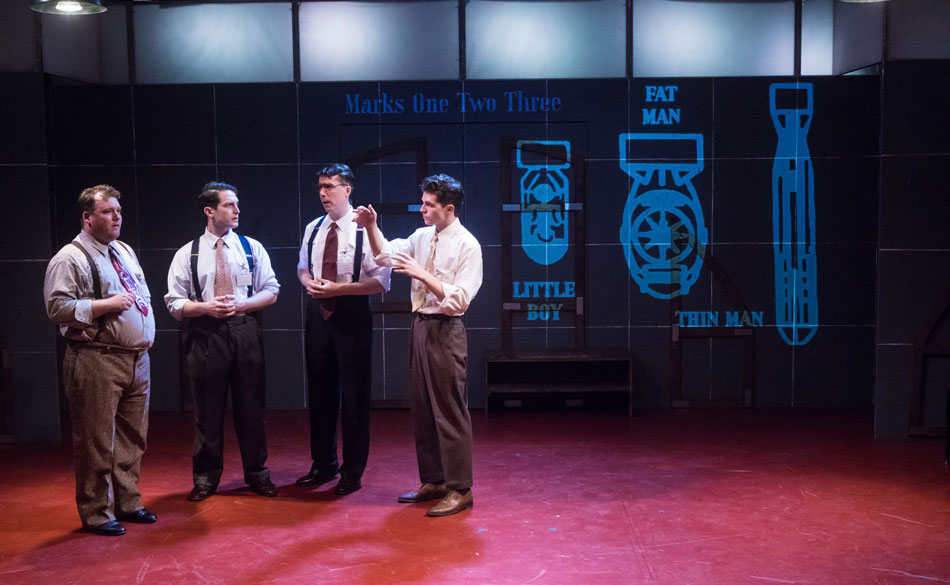
VENICE, Calif.—Let me cut to the chase: The American premiere of Oppenheimer is a dramatic tour-de-force. I grew up in New York City, attending Broadway and Off-Broadway plays such as The Great White Hope with James Earl Jones and MacBird! As a reviewer I’ve seen countless live stage shows. In a nutshell, Rogue Machine Theatre’s production of Oppenheimer is simply one of the best plays I’ve ever seen.
British playwright Tom Morton-Smith’s bio-play about nuclear physicist J. Robert Oppenheimer spans about a decade, from the Spanish Civil War to the Manhattan Project that developed the atomic bombs to shortly after the nuking of Hiroshima. Written for the Royal Shakespeare Company, it opened at Stratford-upon-Avon in 2015, then ran at London’s West End. With its almost three-hour running time, large cast and searing no-holds-barred politics, Oppenheimer didn’t find an American home until Los Angeles’s out-of-the-box Rogue Machine Theatre courageously gave it a U.S. debut October 6.
As the curtain rises, a high-spirited party of scientists and intellectuals in Berkeley raises money for the anti-fascist cause of the Spanish Republic battling the Nazi-backed Franco. Amidst much pro-Red rabblerousing, carousing and drinking, the play locates its protagonist (James Liebman as Oppenheimer) clearly as a man of the Left, if not a dues-paying, card-carrying member of the Communist Party USA. (There is dispute as to whether or not Oppie belonged to the CPUSA: In the play he’s portrayed as a sort of fellow traveler, but his brother Frank (Ryan Brophy) and sister-in-law Jackie (Miranda Wynne) plus other characters are depicted as definitely belonging to the Party.)
The first scene uses cinematic techniques such as freeze frames and intercutting, although the rest of the play unfolds mostly as a series of vignettes that dramatize Oppenheimer’s private life, and his evolution from academic to a U.S. Army officer in charge of the top-secret Manhattan Project in New Mexico’s desert, overseeing a team of unruly physicists as they endeavor to create the world’s first atomic bomb before the Germans are able to give Hitler a nuclear weapon. The fanatical Edward Teller (Dan Via), however, is obsessed with inventing a far more potent thermonuclear weapon of mass destruction.
Oppenheimer comes to disdain the leftists and the “nickels” they raised to fight fascism at Spain. Assuming Superman-like powers at Los Alamos, the promethean physicist will produce the WMD that will destroy the Third Reich. But as with Dr. Frankenstein and his creature, the best laid plans of mice and monsters go awry, and Germany is defeated before the A-bomb can be tested and deployed. This leaves Japan as the target, a country where, as one of the female characters points out, the walls and doors of many homes are made out of paper. Undaunted, Oppie presses on, and even hopes out loud that Tokyo won’t surrender before the atomic payloads can be dropped on Imperial Japan.
Oppenheimer’s leftist links and past catch up to him, as the play comments on the surveillance state and the role of the FBI. It shows the collusion between science and the military (topic of the new book by astrophysicist Neil deGrasse Tyson). Some may see the conflict between scientists and the U.S. government as reminiscent of the current climate change clash between the Trump regime and other global warming deniers vis-à-vis the scientific community.

There is a vigorous debate over whether or not Washington needed to nuke Hiroshima and even more so, Nagasaki, but for those who believe that in doing so many American lives were saved, Oppenheimer ended the war early and was a hero. Nevertheless, he was subsequently persecuted, summoned to testify before the House Un-American Activities Committee, and Oppenheimer’s security clearance was revoked. (How’s that for Washington’s gratitude?)
Oppie did not live out his life span, and Morton-Smith’s bioplay ends shortly after the A-bombing of Hiroshima, where human shadows were literally, eerily blasted onto sidewalks and walls. The drama explores the agony of Oppenheimer and other scientists over the horror they had wrought and what should be done with the nuclear genie, now that it was out of the bottle.
In Oppenheimer Rogue Machine daringly tackles and successfully dramatizes the big existential ideas. The stage is full of flesh-and-blood real people. This is not a pamphlet or leaflet but rather a drama in the Shakespearian sense that always seems truthful. Each vignette is labeled by a projected title and there are some other projections (designed by Nicholas E. Santiago), such as of mathematical equations which scientists in the audience told me were accurate. Rogue’s founding Artistic Director John Perrin Flynn outdoes himself helming his ensemble.
The scientists’ orgiastic eruption of joy after the successful detonation of the device they’ve worked years on suggests the happiness of NASA or JPL engineers upon the success of their missions. But they are putting a man on the moon or a Hubble telescope into the outer reaches of the cosmos and the like, whereas the boys from Los Alamos are unleashing the power of the atom that can end life as we know it on this speck we call Earth. The vignette’s haunting mise-en-scène is startlingly directed and performed.
The cast is all-around great and too large for all of the thespians to be singled out. But Kirsten Kollender as Jean Tatlock—Oppie’s real-life lover, a Communist and psychiatrist—is especially noteworthy and, incicdentally, the latest incarnation of sexually uninhibited female characters that have been popping up on L.A. stages since the #MeToo Movement exploded. Ron Bottitta has a cameo as Albert Einstein but mainly depicts the spit and polish military man General Leslie Groves, who walks a fine line between the Pentagon bureaucracy and keeping his motley crew of creative thinkers in line at Los Alamos. Ryan Brophy is also particularly affecting as Frank Oppenheimer, a good-natured soul who joined the Communist Party in order to try and make a better world and against all the odds, struggles to stay true to his ideals.
James Liebman convincingly portrays Frank’s multi-faceted, conflicted brother. In successfully splitting the atom, J. Robert Oppenheimer also split his own soul and psyche. As he famously said following the successful Trinity Test, quoting the deity Vishnu from Hindu scripture in the Bhagavad-Gita: “Now I am become Death, the destroyer of worlds.”
For those who love hard-hitting drama that has the guts to take on challenging subject matter illuminating the human condition, don’t dare miss this production that epitomizes the stage at its very best. Run—don’t walk. Oppenheimer is electrifying theatre at the Electric Lodge.
Oppenheimer plays through December 30 on Sat. and Mon. at 8:00 pm and Sun. at 3:00 pm at the Electric Lodge, 1416 Electric Ave., Venice CA 90291. For ticket info call (855) 585-5185 or go to www.roguemachinetheatre.com.












Comments